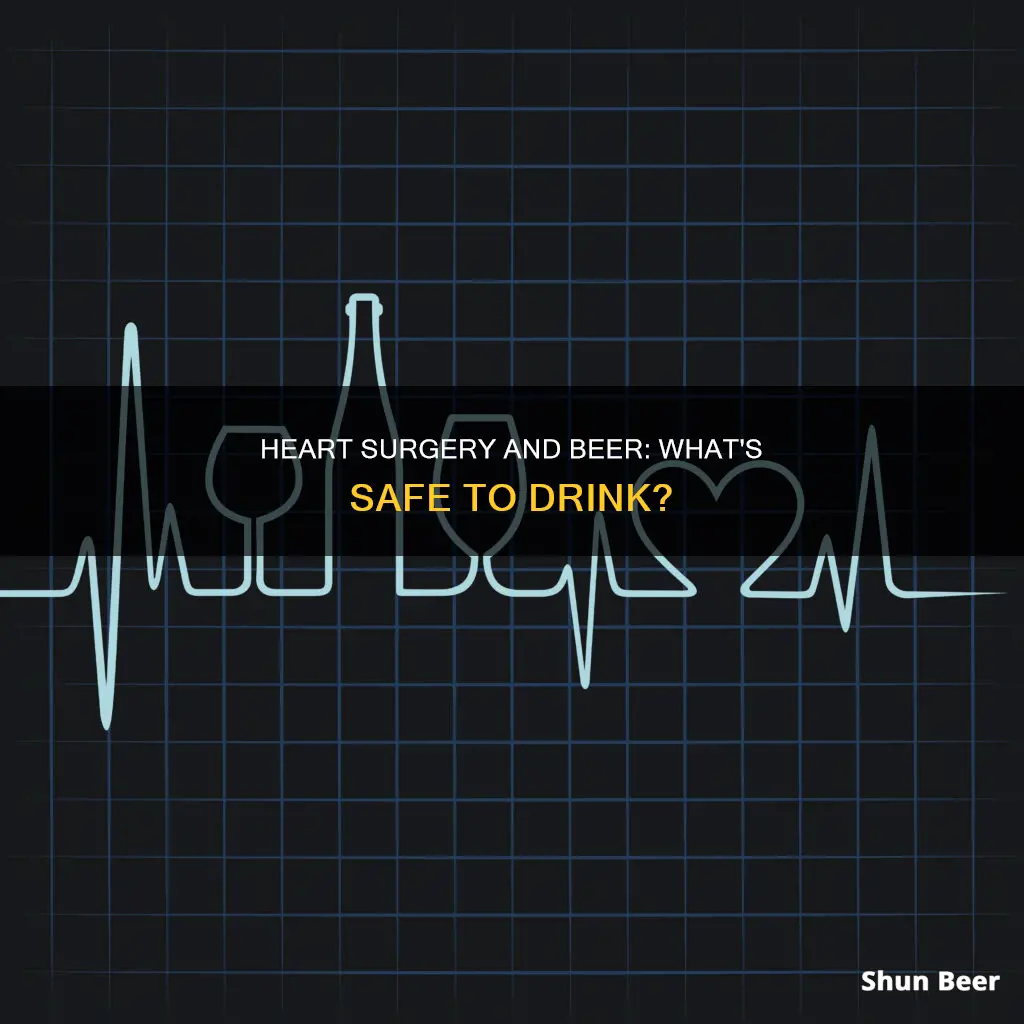
Drinking alcohol after heart surgery is a concern for many patients. Alcohol can have a negative impact on recovery from surgery, affecting the liver, pancreas, heart, and immune system. Heavy alcohol consumption can also lead to alcohol withdrawal, which can cause mild shakiness, sweating, hallucinations, and even death. It is important to be honest with healthcare providers about alcohol use, as it can interfere with the effects of medication and increase blood pressure. While moderate drinking may not affect patients following coronary artery bypass graft surgery, excessive alcohol consumption increases the risk of major acute coronary events and surgical complications.
What You'll Learn
- Alcohol may affect medication effectiveness and increase blood pressure
- Heavy drinking can cause alcohol withdrawal symptoms, such as seizures and hallucinations
- Alcohol negatively impacts the liver, pancreas, heart, and immune system
- Mixing alcohol with pain medication can be lethal
- Alcohol can cause bleeding issues and weaken the immune system

Alcohol may affect medication effectiveness and increase blood pressure
Alcohol can have harmful interactions with prescription medications, over-the-counter drugs, and even some herbal remedies. Drinking alcohol after heart surgery can be dangerous, as it may affect medication effectiveness and increase blood pressure.
Firstly, alcohol can affect the effectiveness of medications. This is because alcohol and medications are metabolised in the liver, often by the same enzymes. This can result in changes in the metabolism or activity of the medication and/or alcohol, leading to potentially serious medical consequences. For example, alcohol can increase or decrease the metabolism of certain medications, which can result in harmful overdoses or render them useless. Alcohol can also enhance the effects of certain medications, particularly those that act on the central nervous system, such as sedatives. This can lead to increased sedation, drowsiness, and impaired motor skills, which can interfere with activities such as driving or operating machinery.
Secondly, alcohol can increase blood pressure. Drinking alcohol can cause the muscles in your blood vessels to narrow, which then makes the heart work harder to push blood around your body, resulting in high blood pressure. High blood pressure is the most common alcohol-related health problem and can increase the risk of chronic kidney disease and vascular dementia. Additionally, binge drinking and long-term heavy drinking can lead to strokes and other serious cardiovascular problems.
Therefore, it is important to be honest with your healthcare providers about your alcohol use, as it can affect your recovery from heart surgery. It is best to ask your doctor if you are permitted to drink alcoholic beverages after surgery and to follow their recommendations for the amount and frequency of alcohol consumption.
Beer Growlers: How Do They Work?
You may want to see also

Heavy drinking can cause alcohol withdrawal symptoms, such as seizures and hallucinations
Heavy drinking can lead to alcohol withdrawal syndrome, which can cause severe symptoms such as seizures and hallucinations. Alcohol withdrawal occurs when a person who has been drinking heavily for a prolonged period suddenly stops or significantly reduces their alcohol consumption. The condition results from the brain's adjustment to the constant presence of alcohol and the compensatory changes that occur in the central nervous system.
Alcohol withdrawal can cause a range of symptoms, from mild to life-threatening. Mild symptoms may include tremors, irritability, anxiety, and agitation. More severe manifestations include delirium tremens, hallucinations, and seizures. These severe symptoms are a result of alcohol-induced imbalances in brain chemistry, leading to excessive neuronal activity when alcohol is withheld.
The risk of alcohol withdrawal increases with the severity of alcohol dependence, higher levels of alcohol intake, and a longer duration of alcoholism. Additionally, prior detoxification, past experience of seizures or delirium tremens, and intense cravings for alcohol can also increase the risk.
Untreated alcohol withdrawal can have serious consequences, including a prolonged hospital stay in the intensive care unit following heart surgery. Therefore, it is crucial to seek medical attention if one experiences withdrawal symptoms. Treatment options include both pharmacological and non-pharmacological approaches, with the aim of managing symptoms and preventing complications.
To prevent alcohol withdrawal and its potential complications, it is recommended to reduce alcohol consumption or abstain completely, especially before scheduled surgeries. This proactive approach can decrease the likelihood of post-operative seizures, reduce the need for sedative medications, and lower the risk of organ failure and other biochemical complications.
Mixing Beer and Tylenol: Is it Safe?
You may want to see also

Alcohol negatively impacts the liver, pancreas, heart, and immune system
The liver is a large organ that sits under the ribs on the right side of the belly. It helps filter waste from the body, makes bile to aid digestion, stores sugar that the body uses for energy, and makes proteins that work in many places in the body, such as proteins that cause blood to clot. Heavy alcohol use can lead to steatotic (fatty) liver, acute hepatitis, and cirrhosis. Steatotic liver is the most common alcohol-induced liver problem, causing a build-up of fat inside liver cells and an enlarged liver. Acute hepatitis is an acute inflammation of the liver, resulting in cell death and permanent scarring. Cirrhosis is the destruction of normal liver tissue, leaving scar tissue in its place, which can cause the liver to stop functioning correctly.
The pancreas is a long, flat gland that lies behind the stomach in the upper abdomen, next to the beginning of the small intestine. It produces enzymes to help digestion and the hormone insulin, which regulates blood sugar levels. Pancreatitis is an inflammation of the pancreas that occurs when digestive enzymes are activated before being released into the small intestine, causing them to attack the pancreas. Alcohol abuse is one of the major contributing factors to acute and chronic inflammation of the pancreas. Alcoholic pancreatitis is potentially fatal and can be short-term (acute) or long-term (chronic). It is characterised by abdominal pain and interference with normal pancreatic functions. Alcohol consumption increases the risk of pancreatic cancer, particularly in those who develop chronic pancreatitis.
Excessive alcohol use can also negatively impact the heart. Drinking more than three drinks per day or binge drinking can affect the outcome of heart surgery and increase the risk of complications such as alcohol withdrawal, which can lead to tremors, seizures, hallucinations, delirium tremens, and even death. Alcohol can also interfere with the effects of medications and increase blood pressure.
Finally, alcohol can impair the immune system. Even just two or three drinks a day can be enough to negatively affect the immune system. This can increase the risk of severe infections and sepsis, which can be life-threatening.
PRP Recovery: Can You Drink Beer Post-Procedure?
You may want to see also

Mixing alcohol with pain medication can be lethal
Drinking alcohol after heart surgery can affect your recovery. It is important to be honest with your healthcare providers about your alcohol consumption so that they can advise you on the safest way to recover from your procedure. Alcohol intake may interfere with the effect of some medications or increase your blood pressure.
Mixing alcohol with medication can cause:
- Nausea and vomiting
- Headaches
- Drowsiness
- Fainting
- Loss of coordination
- Internal bleeding
- Heart problems
- Breathing difficulties
- Memory problems
- Liver damage
Some medications that can react dangerously with alcohol include:
- Anticonvulsants
- Opioids
- NSAIDs
- Antidepressants
- Over-the-counter painkillers
The combination of alcohol and opioids can be lethal. Mixing the two can cause drowsiness and memory problems, and it can also lead to breathing problems and accidental overdose. Older people are at a higher risk of harmful alcohol-medication interactions due to age-related changes in their bodies' ability to process alcohol and medication. Women are also more prone to dangerous drug interactions and alcohol-induced health issues than men because alcohol reaches a higher concentration in their bloodstream.
The Magic Behind Beer Machines: A Brewing Revolution
You may want to see also

Alcohol can cause bleeding issues and weaken the immune system
Alcohol can have detrimental effects on the body, and these are heightened after heart surgery. Drinking alcohol after heart surgery can cause bleeding issues and weaken the immune system. It is important to be honest with your healthcare providers about your alcohol consumption so that they can advise and treat you accordingly.
Firstly, alcohol can cause bleeding issues. Drinking too much alcohol can wreak havoc on the digestive tract, tearing away at the tissue and causing it to become very sensitive. This can lead to tears in the tissue, known as Mallory-Weiss tears, which can result in a substantial amount of bleeding. Mallory-Weiss tears can occur anywhere in the digestive tract, from the throat to the intestines. Alcohol can also cause gastrointestinal bleeding, which can be life-threatening.
Secondly, alcohol can weaken the immune system. Alcohol is a poisonous drug that includes toxic impurities such as esters, aldehydes, fusel oils, and free acids. It takes water away from all body cells with which it comes into contact. When it enters the bloodstream, it weakens the immune system, and the person becomes intoxicated. Alcohol also affects the production of messenger substances in the body, such as interferon, which is responsible for giving the attack signal in the event of an imminent infection. With a weakened immune system, it becomes harder for the body to fight off infections.
In addition to causing bleeding issues and weakening the immune system, alcohol intake may interfere with the effect of medications or increase blood pressure. It is important to consult your doctor about drinking alcohol after heart surgery, as it may affect your recovery.
Beer Transfer Mechanics: How Does It Work?
You may want to see also
Frequently asked questions
It is not recommended to drink beer or any other alcoholic beverage after heart surgery without first consulting your doctor. Alcohol intake may interfere with the effect of some medications or increase your blood pressure. If you are permitted to drink alcohol, it is recommended that women do not have more than one drink per day and men have no more than two.
Moderate drinking is defined as up to three alcoholic drinks per day (or 5 to 30 grams of alcohol per day). This amount of alcohol has been found to reduce the risk of major acute coronary events by about 9%. However, it is important to note that this amount refers specifically to male patients.
Drinking alcohol after heart surgery can increase the risk of serious bleeding, weaken the immune system, disrupt the healing of wounds, and increase the risk of infection. Alcohol can also interact with opioid pain medication and cause sudden death. Therefore, it is important to consult your doctor before consuming any alcohol after heart surgery.







